Chantler, Howcroft & Street - Family History Research
Research into the Chantler, Howcroft and Street families of Elton and
Radcliffe, and the farms called Chantlers, Pilkingtons and
Higher Spen Moor.
Thomas Chantler (1751 - 1831), of Starling, Elton
Thomas Chantler was born in about 1751.
He originated from Pendleton in Salford; his family later
owned
some properties in that area, and family members were buried at St.
Mary, Eccles,
the parish within whose boundaries Pendleton then fell. By
1777,
when he was about
27 years old, he was resident in Outwood. He married Betty
Whittaker at Prestwich Parish Church in December of that year, and four
months later
their first child Ann was born. At this time his occupation
was
recorded as whitster (a bleacher of cloth). Two years later
when his eldest son Ellis was born, he
had moved to Elton, and was by then recorded as an inn keeper.
Thomas and Betty had twelve children over a twenty three year period; Ann
(1778), Ellis (1780), Peter
(1781), John (1784 ob. inf.), Samuel (1787), Betty (1789), Mary (1791
ob. inf.) Margaret (1793),
Thomas (1795), Mary (1796) and Esther (1801), Hannah (1801 ob. inf.)
Thomas' wife Betty died in 1804, and was buried at Eccles Parish
Church. The parish register records her, incorrectly, as the
wife of James Chantler of Radcliffe, but we can see from the monumental
inscription that this was in fact the wife of Thomas:
HERE
Resteth the Body of
Thomas Chantler of Starling who died
March 3rd 1831 in the 80th year of his age
Betty Wife of Thomas Chantler
of Starling who departed
this life August 12th 1804
aged 46 years. Also John
their Son who departed this
life May 25th 1785 aged 1 year
and 6 months. Also Mary their
Daughter who departed this
life Septr 28th 1792 aged 1 year
and 3 months. Also Hannah
their daughter who departed
this life Octr 24th 1802
aged 1 year and 5 months
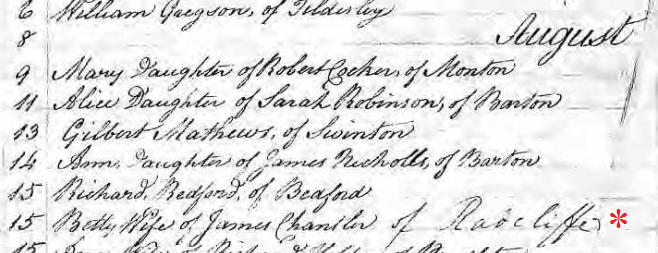
Bishops Transcripts of the Registers of Eccles Parish
Church
15 [August] Betty Wife
of James Chantler of Radcliffe
Note the "of Radcliffe" is in different handwriting and seems
to have
been added later
The earliest record of Thomas and Elizabeth Chantler living in Starling
is in 1785, in the burial records of their infant children John
and Mary at Eccles (in 1785 and 1792). On the 1801 census, Thomas
Chantler is listed as being resident at Starling, with a household of
ten people; five males and five females, four of whom were
employed in "trade, manufacture or handicraft", and six who were not -
none of them employed in agricultre.. From 1803 Thomas Chantler
can be
found paying two shillings and eight
pence rent to the Earl of Wilton for land in Radcliffe (Land Tax
Records, LRO). Starling was a hamlet on the boudary of
Radcliffe
and Ainsworth.
In
1809, Thomas' eldest daughter Ann married Thomas Street, the son of John
Street, the farmer from a neighbouring farm called Pilkingtons.
In
1817, another daughter married William Street, a younger brother of
Thomas Street.
Thomas died on 3rd April 1837. In his will
he is described as a yeoman, and held premesis in Irlam oth' Heights
and Radcliffe. There were properties at this time in Irlam
oth'
Heights named "Chantlers
Buidlings".
Thomas' son Peter lived next to Chantlers Buildings in 1841
and 1851, so it is possible that these were the premesis that Thomas
referred to in his will. He was buried on 9th March 1831 at
St. Mary, Eccles; "Thomas Chantler of Bury, aged 80 years." and "Thomas
Chantler of Starling" on his grave stone.
(Below) Thomas Chantler's signature from his will written in 1825

I have assumed that the farm called Chantler's (as seen on the 1847
Ordinance Survey map below) was the property that Thomas lived at, and
that it was named after him (although it may in fact have been his son
Ellis). Note the close proximity of Starling (underlined
purple), Pilkington's farm
(underlined green), where the Street family lived, and slightly further
south Spen Moor (underlined blue), where subsequent generations of the
Street family farmed. In his 1842 will, Ellis Chantler left to his
sister Esther Ramsbottom, wife of Thomas Ramsbottom, "properties on the
south side of Cockey Lane in Elton, currently occupied by
[Ellis]". The farm stayed in the hands of the Ramsbotton
family
until at least 1901. The building is no longer there, but is
remembered in the local street name Chantlers Avenue, and local primary
school Chantlers Primary School.
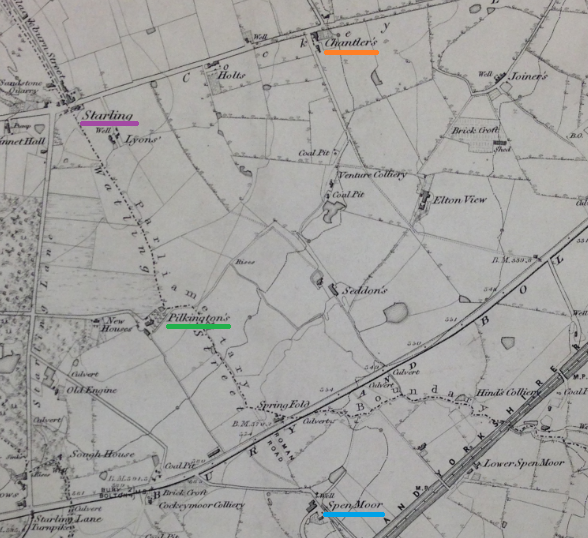
Ellis Chantler of Elton
Thomas' eldest son Ellis Chantler became a successful business man.
In 1818 we see Ellis listed in the land tax records, at a tax
of
one shilling and half a pence on an unnamed property in Elton, taking
over from John Warren who had previous occupied the property.
In
1825, he is listed in the local trade directory as being
of Cockey
Lane, a manufacturer of cotton goods. In 1830, the land tax
records
show
us that he had leased an additional two properties; Two Trees
Farm (1
shilling) and Brooks (2 shillings and 6 pence) as well as the initial
unnamed property. On the 1841 census we find him living at
Brooks. Ellis died in 1842, his estate was valued at under
£16,000. In his will he left property
and
money to his siblings and their children, including property in Elton,
Pendleton, Salford, Manchester, Bradshaw and Harwood.
Pilkington's Radcliffe
Pilkingtons is a farm that lies on the old Roman road between
Manchester and
Ribchester. During the mid to late 1700s it was in the tenure
of the Howcroft family. In 1766, it was held by John
Howcroft, with 13 closes of land (GMCRO E7/18/1/2).
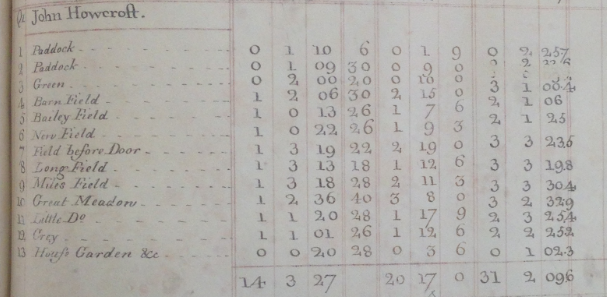
Above: Earl
of Wilton Rentals for Pilkingtons, Radcliffe, 1766. John
Howcroft.
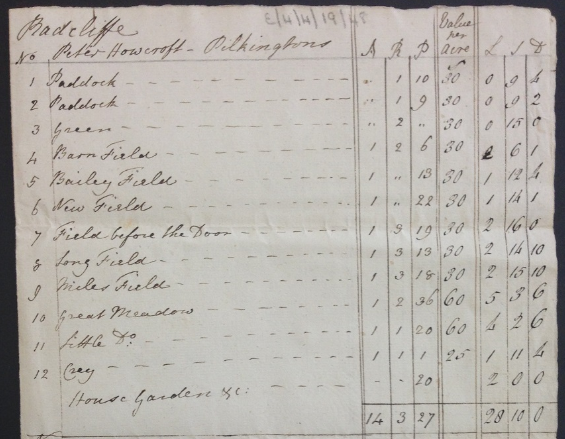
Above: Earl
of Wilton Rentals for Pilkingtons, Radcliffe E4/4/19/48.
Peter Howcroft. This document is undated but other
documents in the same collection are dated between the mid to
late 1700s. The same document also contains accounts for
William Olive of Barlows, and John Ball of Cow Grave Fold in Ainsworth.
Peter & Ann Howcroft had two daughters
baptised at Radcliffe in the 1750s; Ann and Ellen. In 1777,
when she was 23 years old, Ellen married to John Street. John
and Ellen Street had nine children; James (1777), John (1779 -
died in infancy), Thomas (1780), John (1783), Peter (1785), Ann (1788),
William (1790), Alice (1794) and Joseph (1799). Between 1777
and 1794, John's occupation is recorded as weaver, and then from 1799
as farmer, at which point we can assume he has taken over from his
wife's parents as farmer at Pilkingtons.
In the Radcliffe land tax records we can find John Street paying
varying amounts of land tax for the whole of the period covered by the
records (1780 - 1831). What is slightly puzzling about this
is that he died in 1814, but continued to be recorded paying land tax
until 1831. It is possible that it was his son
John who was paying the land tax after he died in 1814, who would have
been 31 years old at that time. In his will John (senior)
left Pilkingtons farm for his wife Ellen; she died in 1821.
By 1841
the farm was occupied by their youngest son Joseph and his family, and
by 1851 it was in the hands of Adam Howarth (of whom more later).
Pilkington's still exists (in 2014), and is still used as a farm -
now known as Pilkington Fold Farm. Unfortunately the
old farm building no longer exists, and looks to have been replaced
with a new building in the mid-1900s. Interestingly, the lane
that leads up to the farm is called "Street Lane", which may well
remember the Street family who lived there.
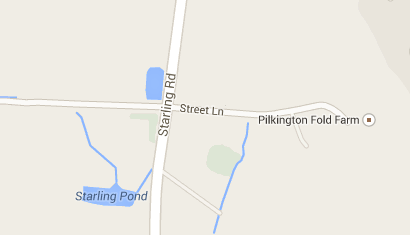
Street of Higher Spen Moor, Radcliffe
Spen Moor in Radcliffe was divided into a number of
farms; Higher, Lower and Middle Spen Moor (the latter also known as
Israels, presumably after Israel Taylor who occupied the farm
in 1729).
The earliest reference I have found to it is the 1612 burial at
Radcliffe Parish Church of "Richard Alens, elder, of Spen Moure".
Subsequent references are as follows:
- 1612 - Burial at Radcliffe; Richard Alens, elder, of Spen
Moure
- 1612 - 1665 - 11 burials at Radcliffe of members of the
Allen family of Spen Moor
- 1626 - 1638 - 5 baptisms at Radcliffe of members of the
Allen family of Spen Moor
- 1682 - 1689 - 3 baptisms at Radcliffe of members of the
Allen family of Spen Moor
- 1684 - James Holt of Spenymoor Admon with Inv 1684, Will
- 1702 - Thomas Yates of Spen Moor, baptism of daughter
- 1705 - 1713 4 baptisms of children of Richard Barlow of
Spen Moor
- 1708 -Burial at Radcliffe; child of Richard Barlow
- 1714 - Burial at Radcliffe; Anne, wife of George Allen of
Spen:
- 1725 - Lease of Spen Moor to Richard Allen, for lives of
himself and his son Richard Allen and Esther Sandiford (GMCRO
E4)
- 1729 - Burial at Radcliffe; Mary d. of Israel
Taylor, Spend-moor
- 1729 - Burial at Radcliffe; Peter Walker, Spend-moor,
Radclyffe
- 1733 - John Medowcroft of Spend-moor, Radcliffe
- 1736 - Baptism of child of John Hardman of Spenmoure
- 1737 - Baptism of child of Thomas Meadowcroft of Spen Moor
- 1766 - Richard Allen at Higher Spen Moor, 28
acres, 0r, 39p
- 1766 - Thomas Gregory at Israels, 4 acres,
2r, 24p
- 1766 - Thomas Gregory at Lower Spen Moor, 12
acres, 0r, 17p
- 1773 - Richard Allen of Higher Spen Moor, son of Richard
Allen, recorded as being "living and hearty" aged 51 (born about 1722).
The other two people named on the lease are dead (Richard
Allen snr. and Esther Sandiford). (GMCRO E4)
- 1773 - Mary Ramsbottom of Spen Moor, recorded as being
"living and hearty" aged 56, against the original lease of Thomas
Gregory (GMCRO E4)
- 1791 - Richard Allen of Spen Moor, parish of Radcliffe,
Will (Supra)
- 1792 - Richard Allen of Spen Moor, co. Lancs. yeoman I. a/c
etc. (Account)
- 1834 - Thomas Gregory, Spend Moor, Radcliffe, farmer, Will
(Supra)
- 1836 - John Davenport of Spend Moor, farmer. Will (Infra)
- 1836 - Thomas Street, Higher Spen Moor (Trade Directory)
- 1841 - Census; Thomas Street, son of John Street of
Pilkingtons
- 1851 - Census; Thomas Street
- 1861 - Census; Peter Street, son of Thomas Street
- 1871 - Census; Peter Street
- 1881 - Census; Peter Street (died and left will in
1881)
- 1891 - Census; Thomas Moore (son of Betty Street &
William Moore, nephew of Peter Street)
- 1901 - Census; Thomas Moore
- 1911 - Census; Nancy Moore (Thomas' widow)
Further research: There are 21 Lancashire wills of the Allen
family of Radcliffe recorded between 1584 and 1836
In
the 1836 Bury Trade Directory, Thomas Street is recorded as being the
farmer there. He was the son of John and Ellen Street of
Pilkingtons. He
married
Ann Chantler in 1809, and they moved over the road to Higher Spen Moor.
The couple had 6 children over a 10 year period; Betty
(1810),
James (1811), Peter (1813), Hannah (1815), Alice (1817) and Thomas
(1819). Thomas (senior) was still at Spen Moor in 1841, with
his
children Peter, Betty and Thomas; his wife Ann is at the time
either visiting, or living with, her wealthier brother Ellis Chantler,
the cotton manufacturer. Ann died in 1844, and Thomas in
1854,
seemingly intestate. The farm passed to their son Peter, who
lived there until he died in 1882. He never married, but was
not
short of company at the farm, having bought up his sister Betty's
children Thomas and Betty Moore, whose parents had died while the
children were still young. When Peter died, he left the farm
in
trust to three of his nephews, to be sold and the profits distributed
equally amongst all his nephews and nieces. His nephew Thomas
Moore continued to live at the farm until 1901 (at least), and Thomas'
widow Nancy was still there in 1911.
Part of Spen Moor was
purchased by Peel Holdings Limted in the 1980's, and has been the
subject of several contentious planning applications over a thirty year
period. The company wants to build over a hundred houses at
the
site, but the applications have been met with resistance. There a
several document relating to this on the Peel
Holdings website, including an architectural assessment of
the site.
In
2006 there was a murder at the Higher Spen Moor. William
Kenyon,
a dairy farmer who had lived at the farm for 15 years, was shot dead by
Peter Grass, who had been a tenant there for 5 years, and lived in the
adjoining cottage. The two men had had a disagreement, which
then
escalated, and culminated in Grass shooting Kenyon with a shotgun.
Grass was convicted of murder and sentenced to life
inprisonment,
Higher
Spen Moor farm is still there (in 2014), and still operates as a farm.
The picture below was taken in 2014 - whether this is the
original building that the Street family would have lived in I don't
know.
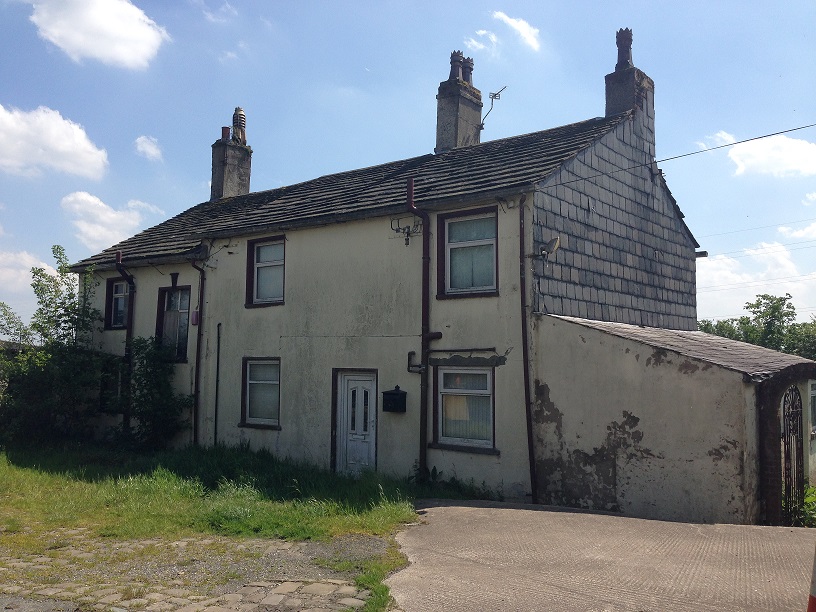
Street Taylor of Top oth' Moss, Breightmet
Thomas Street
was the youngest son of Thomas Street and Ann Chantler. He
was
born in 1819 and was raised on the farm at Higher Spen Moor.
When
he was 27 years old he married Ann Howarth, the daughter of Adam
Howarth, who was at the time farming at Pilkingtons, which in a
generation earlier, had been farmed by the Street family.
Less
than six months after the wedding, on the 19th December 1846, Ann gave
birth to a son named Peter. Sadly, she died two weeks later.
Thomas
then appears to have had a relationship with Olive Taylor of Unsworth.
Olive was at that point a spinster and a single mother of a
ten
year old boy. Her son John Taylor had been born in 1837 - he
is
recorded as illegitemate and his father's name is not given.
James was born on 3rd December 1847. He was
recorded as
"James Taylor Street" in the baptism register, son of Thomas Street,
farmer, of Radcliffe, and Olive Taylor of Unsworth".
You might
have expected that Thomas and Olive would marry at this point, but
Thomas' attentions were elsewhere; in fact a month after his
illegitemate son James was born, he remarried to someone else; Betsy
Olive, a 20 year old spinster from Bury. Thomas &
Betsy lived
at Scar Top in Radcliffe, and had three children; Ann (1848), James
(1851) and Jane (1854), the latter of whom died aged three.
On
the face of it, Olive Taylor appears to have been abandoned by Thomas,
and lived with her parents and two sons John and James in Unsworth.
In September 1856 Thomas' second wife Betsy died aged 28.
Seven months later, Thomas remarried again, this time to the
now
45 year old Olive Taylor, the woman who ten years earlier he appears to
have jilted. They moved to Top oth' Moss farm in Breightmet, where
Thomas died in 1865. Olive stayed on at the farm, and by
1881,
still lived there, but had handed over management of the farm to her
son James Street Taylor. James Street Taylor predeceased his
mother, dying in 1885 aged 37. According to family tradition
he
had caught pnemonia when working in the fields. His wife
subsequently remarried to James Coates, and Top oth' Moss farm stayed
in the Coates family for some time to come.
This is a fairly
complicated set of relationships to understand, and the main question
it raises for me, is was James Street Taylor really
Thomas Street's son? His baptism record clearly states that
he
was, and when James Street Taylor got married in 1874 he stated that
his father was Thomas Street. Indeed, why would Thomas Street
marry to Olive Taylor, if she was falsely claiming to have borne his
child? That's fairly compelling evidence. But
there are a
few other factors which lead to some doubt. Four years after
"illegit James" was born, Thomas & Betsy had a son they named
James, meaning that Thomas had two sons called James, which seems a bit
strange - granted that he may not have had a say, or even a knowledge
of, the naming of his first son James.
Another
possibility which makes a complicated picture yet more complicated, is
that there may have been familial connection between Olive Taylor and
Thomas's first wife Ann. Olive's parents were Samuel Taylor
and
Ann Haworth of Unsworth. Thomas Street's first wife Ann
Howarth
was the daughter of Adam Howarth, of Unsworth. When Olive
Taylor
and Thomas Street married in 1857, one of the witnesses was Adam
Haworth. This raises the question of whether there was a
familial
connection between Thomas' first wife, and Olive Taylor, through the
Haworths of Unsworth.
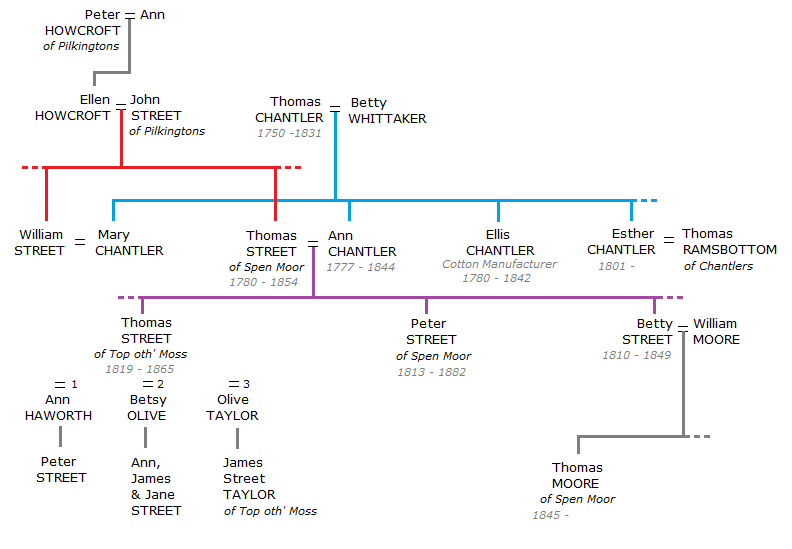
Notes for Further Research
- GMCRO
- Accounts relating to Peter Howcroft of Pilkingtons
(E4/4/19/48)
- Radcliffe: Surveys, Valuations and Schedules of leases or
tenants E7/18 1720 - 1785
- Township Rentals E4/47/1-107 (8 large boxes of
documents)
- Radcliffe,
Little Lever and Outwood (later called Pilkington)
E4/48/1-133 [n.d.] 1774 - 1841 (14 large boxes of documents)
Other References







